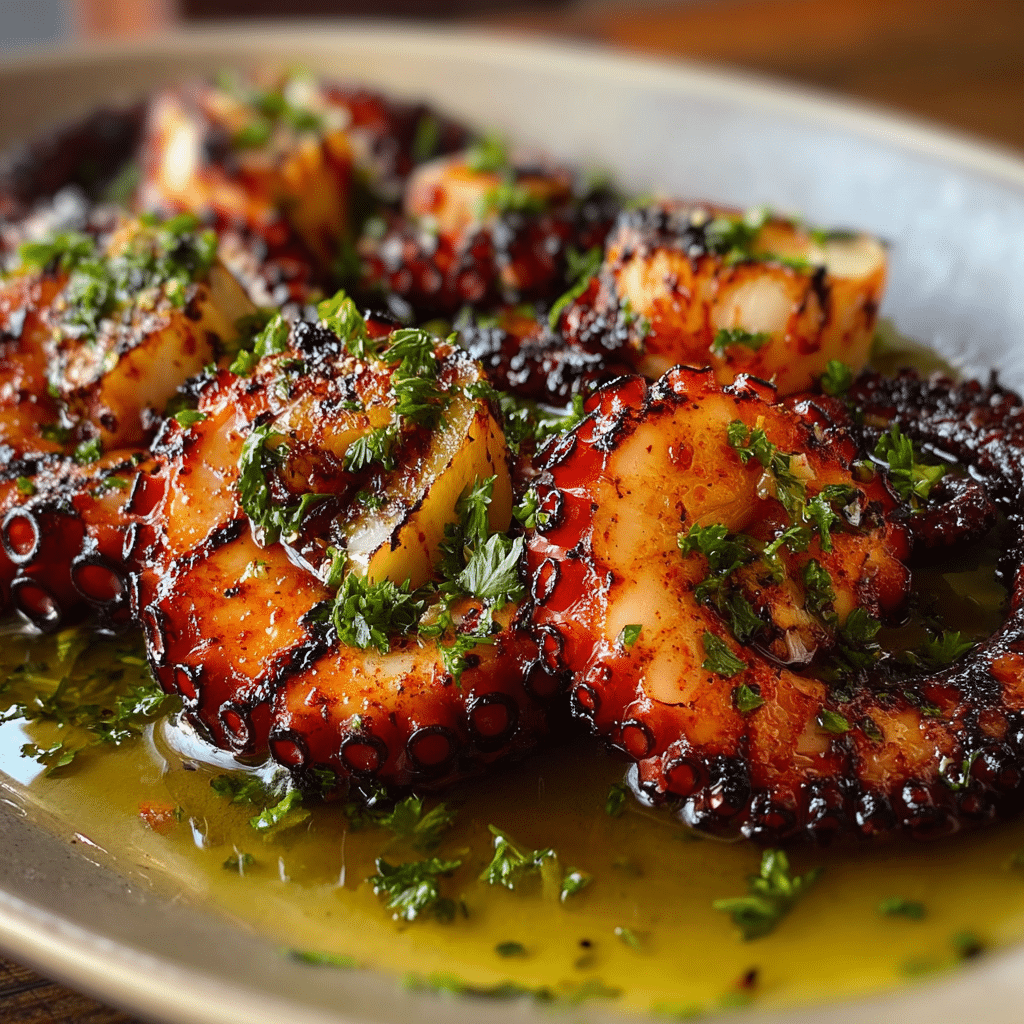This grilled octopus recipe delivers tender, smoky tentacles kissed by lemony brightness and fragrant spices. It’s a showstopper that merges Mediterranean soul with easy summer grilling—perfect for outdoor entertaining or a seaside-inspired dinner.
With a gentle simmer to tenderize and a quick sear on high heat, every bite has that irresistible charred edge. The citrus marinade deepens the flavor, while fresh parsley adds a pop of color. Serve it alongside crisp salad or grilled veggies and transport your tastebuds straight to the coast.
Full Recipe
Ingredients:
-
2 lb whole octopus, cleaned
-
1 cup dry white wine
-
2 bay leaves
-
1 lemon, halved
-
4 garlic cloves, smashed
-
1/4 cup extra‑virgin olive oil, plus more for grilling
-
2 tbsp fresh lemon juice
-
1 tsp lemon zest
-
2 tsp smoked paprika
-
1/2 tsp red pepper flakes (optional)
-
Salt and freshly ground black pepper
-
Fresh parsley, chopped (for garnish)
Directions:
-
In a large pot, combine octopus, white wine, bay leaves, half the lemon, and garlic. Cover with water. Bring to a simmer, then reduce heat and gently simmer for 45–60 minutes until tender when pierced.
-
Remove octopus and let cool slightly. Reserve cooking liquid.
-
Slice tentacles into 3–4‑inch pieces.
-
In a bowl, whisk olive oil, lemon juice, zest, smoked paprika, red pepper flakes, salt, and pepper. Add octopus pieces and toss to coat. Marinate 15–20 minutes.
-
Preheat grill or grill pan to medium‑high and brush with olive oil.
-
Grill octopus 2–3 minutes per side until charred and slightly crisp.
-
Remove from heat and drizzle with reserved cooking liquid if desired. Garnish with parsley and serve warm.
Prep Time: 15 minutes | Cooking Time: 60 minutes | Total Time: 1 hr 15 min
Kcal: ~200 kcal per serving | Servings: 4 servings
Introduction to Grilled Octopus: A Mediterranean Gem
Grilled octopus is one of the most celebrated dishes in Mediterranean cuisine, revered for its balance of flavors, satisfying texture, and stunning presentation. With origins rooted in Greek and coastal Spanish culinary traditions, this dish has transcended borders to become a fine-dining staple and backyard grilling favorite alike. What makes grilled octopus truly special is the harmony of land and sea it offers—earthy olive oil, zesty citrus, aromatic herbs, and, of course, the briny, tender richness of perfectly cooked octopus.
Unlike many other seafood recipes that require minimal handling, octopus benefits from a dual cooking approach—first gently simmered until tender, then seared on a hot grill to develop smoky char and crisp edges. This contrast of textures, coupled with its bold flavor profile, makes grilled octopus a standout on any menu.
The History and Cultural Significance of Grilled Octopus
Octopus has been consumed for thousands of years across various coastal civilizations. In Greece, grilled octopus is a national favorite, often served as part of a mezze spread with ouzo or white wine. It’s common to see octopus drying on lines outside tavernas—a traditional method that tenderizes it before grilling. In Portugal, Spain, and Italy, octopus is equally beloved, appearing in salads, stews, and tapas.
The dish not only reflects regional flavors but also storytelling, hospitality, and a deep connection to the sea. It has a rustic charm—simple ingredients elevated through technique and tradition. As a result, grilled octopus has become a symbol of Mediterranean living: fresh, relaxed, and celebratory.
Flavor Profile and Culinary Appeal
Grilled octopus offers a distinctive flavor experience that bridges briny, savory, smoky, and zesty notes all in one bite. Its flesh, when cooked correctly, is surprisingly tender—almost creamy—with a slightly chewy, satisfying bite. The smoky char from grilling adds depth, while citrus-based marinades (like lemon and olive oil) brighten the natural seafood flavor.
Aromatics like garlic, bay leaves, and smoked paprika elevate the octopus without overwhelming it. The final garnish of parsley adds a touch of freshness, color, and balance. Together, the elements create a multidimensional dish that is both luxurious and down-to-earth. It appeals to food lovers who appreciate simple ingredients used with intention and skill.
Health Benefits of Octopus
Octopus is not only delicious but also highly nutritious. It’s rich in lean protein, making it ideal for those looking to build or maintain muscle mass. It’s low in fat yet packed with essential nutrients like vitamin B12, iron, selenium, and omega‑3 fatty acids. These nutrients support brain function, boost energy levels, and promote heart health.
Because of its high protein-to-calorie ratio and low carbohydrate content, octopus fits well into keto, paleo, and Mediterranean diets. Moreover, when grilled with healthy fats like extra virgin olive oil, it becomes a wholesome option for anyone seeking a flavorful, nutrient-dense meal.
Why Tenderizing Is the Key to Perfect Octopus
One of the most common concerns with octopus is its potential toughness. When not cooked properly, it can become rubbery or dry. That’s why tenderizing is crucial. Traditionally, octopus is tenderized by pounding or freezing, but the most reliable modern method is slow simmering in a flavorful liquid.
Simmering not only tenderizes the meat but also infuses it with subtle layers of flavor from aromatics like garlic and bay leaves. After it’s tender, finishing it on the grill adds the coveted crispy-charred exterior without overcooking the inside. The combination of textures makes every bite satisfying and memorable.
Serving Suggestions and Pairings
Grilled octopus pairs beautifully with a wide variety of sides and garnishes. In Mediterranean tradition, it’s often served with lemon wedges, a drizzle of olive oil, and a sprinkle of fresh herbs. It also goes well with grilled vegetables like zucchini, eggplant, or asparagus, which echo the smoky notes from the grill.
For starches, consider pairing it with crusty bread, roasted potatoes, or a citrusy couscous salad. Octopus also shines atop leafy greens, lentil salads, or chickpea purées. For beverages, crisp white wines such as Assyrtiko, Albariño, or Sauvignon Blanc make excellent choices, as do dry rosés and light lagers.
Entertaining with Grilled Octopus
This dish makes a great impression for dinner parties or outdoor gatherings. It’s visually stunning, thanks to its curled tentacles and caramelized edges, and can be plated beautifully with herbs, citrus slices, and finishing oils. Despite its gourmet presentation, it’s surprisingly manageable to prepare and perfect for those looking to impress without spending hours in the kitchen.
You can prepare the octopus in advance by simmering and marinating it earlier in the day, then grill it fresh right before serving. This flexibility makes it ideal for hosts who want to stay engaged with their guests.
Tips for Choosing and Cleaning Octopus
When shopping for octopus, look for whole octopus that has been cleaned or ask your fishmonger to do it for you. Frozen octopus is often more tender due to ice crystals breaking down muscle fibers during freezing. If using fresh octopus, it’s essential to clean it thoroughly—removing the beak, eyes, and inner organs.
Be mindful of the size. Smaller octopuses (around 2–3 pounds) tend to be more tender and easier to work with. Larger octopuses may require longer simmering times and more care in tenderizing.
How This Dish Reflects Modern Food Trends
Grilled octopus hits many of today’s food trends: high-protein, low-carb, Mediterranean diet-approved, and sustainable seafood. Diners are increasingly seeking dishes that are both adventurous and health-conscious, and grilled octopus fits perfectly into that narrative.
Its versatility also makes it adaptable to global flavor profiles. While the Mediterranean version is classic, grilled octopus can be paired with Asian-inspired glazes, Latin American salsas, or Middle Eastern spices to cater to different palates. Its ability to take on bold flavors makes it a favorite among creative chefs and home cooks alike.
Sustainability and Responsible Sourcing
As demand for octopus grows, sustainability is becoming an important consideration. Octopus is a wild-caught species, and while many fisheries are responsibly managed, it’s essential to choose sources that follow ethical harvesting practices. Look for octopus that is certified by sustainability groups or sourced from regions known for responsible marine stewardship.
Opting for seasonal, local catches whenever possible not only supports sustainability but also ensures fresher, more flavorful seafood.
Conclusion: A Dish That’s Worth the Effort
Grilled octopus may seem intimidating at first glance, but with a little knowledge and preparation, it becomes a highly achievable gourmet dish. Its rich cultural roots, bold yet balanced flavor profile, and nutritional benefits make it a rewarding addition to any home cook’s repertoire. Whether you’re hosting a summer barbecue, preparing a romantic dinner, or simply exploring new ingredients, grilled octopus offers a memorable and delicious experience.
Don’t be afraid to try it—you might discover your new favorite seafood recipe. Its unique texture, vibrant marinade, and smoky char will have guests coming back for seconds, and you’ll appreciate how this traditional Mediterranean treasure transforms into something truly special right on your grill.






